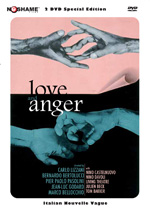|
Reviews of Recent Independent, Foreign, & Documentary Films in Theaters and DVD/Home Video
LOVE AND ANGER (1968)
"L'Indifferenza"
"L'Agonia"
"La Sequenza del Fiore di Carta"
"L'Amore"
"Discutiamo, Discutiamo"
This Italian anthology of five
loosely connected segments is unmistakably
from 1968. According to director Carlo Lizzani's DVD interview, each episode
was to be a variation of a gospel, though this is only apparent in the Good
Samaritan figure of "L'Indifferenza," directed by Lizzani. An urban
nightmare played out in broad daylight, its gritty on-location scenes of New
York City rival that of Midnight Cowboy. In Pasolini's brief "La Sequenza del Fiore di
Carta," a happy-go-lucky youth breezes down Rome's Via Nazionale, holding a
giant flower - it is 1968 - while archival footage of Hitler, falling
bombs, Pope Pius II, and LBJ fade in and fade out; the past is not so
distant. A dying man does not get his
wish to be alone in Bertolucci's "L'Agonia." Instead, he's surrounded by accusatory
mourners, performed by the noted and peripatetic troop The Living Theatre.
Reflecting his interest in this company, Bertolucci patiently follows the
actors improvising as they writhe, moan, scream, and drool. What was far out
then remains far out now.
Didactic politics tromp "Amour," a precursor to director Jean-Luc Godard's
more radical films a decade later. A man discusses with a woman the
goings-on of another couple in Italian while she responds in French, as if
they're watching a film, the biblically entitled "The Departure and Return
of the Prodigal Children." Both couples appear to be on the same rooftop
garden. The voyeurs scrutinize art, from noting "Cinema is the art of lying"
to praising fellow director Bertolucci as a bolt of lightning representing
the truth. Politically, the French woman predicts, "America will be the
theatre of great wars fought by all humanity," while on the screen a title
provocatively reads "Hecho en Cuba." Enthused by Youth Power, students
act out a riotous classroom demonstration in "Discutiamo, Disuctiamo." One
dons a beard, acting as a professor who will be later denounced as a tool of
a class-conscious university. With little camera movement, the Brecht- and
Mao-quoting polemic comes across as a filmed play, one that could easy be
imagined taking place in Berkeley. As a witness to the times, the anthology
is a fascinating time capsule. For those not familiar with the later works
of Bertolucci or the early films of Godard, the shorts will be an
illuminating change of pace.
DVD Extras: Filmed in long takes, often from unflattering angles, the
dry talking-head documentary does have intermittent moments of appeal for
those interested in the Italian Nouvelle Vague and in post-war film in
general. Lizzani, now in his late eighties, started out a generation earlier
than the other directors as a neorealist director. He discusses
working with Pasolini, as well as his political break from his left-wing circle. After living in China in 1957, Lizzani foresaw that Mao would
become another Stalin. And as with Lizzani, Pasolini is also the man of the
hour in assistant director Maurizio Ponzi's reminisces. His take on the
director's personality offers a fresher and more personal insight than that
featured in the recent DVD extra of Pasolini's Teorema (Koch Lorber). Kent Turner
|
